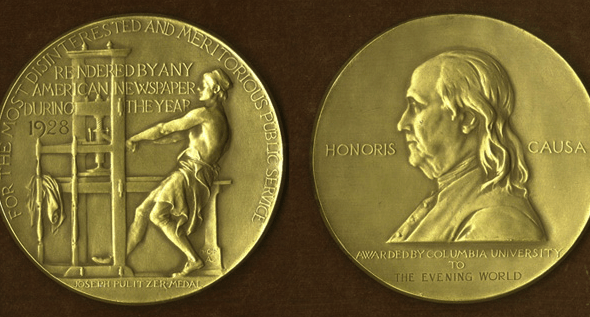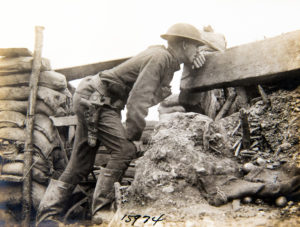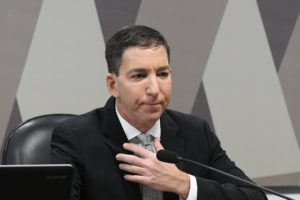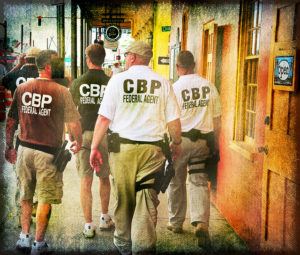Truthdigger of the Week: The Pulitzer Prize Committee
When institutions lend their support to the powerless, as the Pulitzer committee did this week to whistle-blowers and their newspapers, the battle is no longer merely between the weak and its oppressors.When institutions lend their support to the powerless, as the committee did to the NSA reporters, the battle is no longer merely between the weak and its oppressors.
What splendid courage! The Pulitzer Prize committee honored the essence of justice by bestowing its most prestigious award—for public service—to The Guardian and The Washington Post for exposing one of the most important stories concerning civil liberties in the history of journalism.
—Truthdig Editor-in-Chief Robert Scheer
Caught in the thrum of our individual lives, it is easy to forget that history is being made every day. Think of the past. What comes to mind? Images of America’s golden age? The cartoons you saw on television as a child? The destruction of the World Trade Center?
9/11 remains fresh in the mind because it was the beginning of a series of events that continue today, 13 years later. In the days that followed, the prioritization by our political leaders of so-called national security over all kinds of personal liberties followed swiftly, but few Americans noticed the deep consequences of the changes being made in the laws laid over them. As a nation, Americans may as well have been like children asleep in bed while the parents worked through the night, planning the days ahead.
Tony Benn, the British Labour politician who died in March, characterized the struggle for a better world as follows: “Every generation has to do it for themselves again; there is no railway station called justice that if you catch the right train you get there. Every generation has to fight for their rights because rights are taken away.”
As rotten as things currently are, the present generation of Americans has been graced with such champions. The most conspicuous among them is former National Security Agency contractor Edward Snowden, but they include all those who have worked in the halls of power and understood that their obligation is ultimately to society, not the institution that sets their schedules and signs their paychecks. They are Pfc. Chelsea Manning, former State Department adviser Jesselyn Radack and retired NSA officers Thomas Drake and William Binney. Their predecessors include Daniel Ellsberg and yes, founding father Benjamin Franklin.
Then there are their supporters — the publishers, editors and reporters who parse their messages and deliver them to the public. From their position as mediators of information, these individuals and the organizations they pilot straddle the divide between officialdom and the wilder territories beyond. When they take on a whistle-blower’s cause, they offer institutional cover, which instructs the public to take it seriously. The battle at that point is no longer merely between the public and its oppressor, but between larger authorities. The scales are evened a little or a lot.
The current generation has these entities too. Their outlaws include WikiLeaks Publisher Julian Assange, who for a year and a half has been confined to the interior of Ecuador’s embassy in London due in part to the legal pursuit of multiple governments because of his efforts to expose the wrongdoing of those governments.
Fortunately, The Guardian and The Washington Post — two papers that enjoy long-standing reputations that Assange’s WikiLeaks lacks — are among them as well. On April 14, both newspapers were honored by the Pulitzer Prize committee with its Public Service award for explaining the grave significance of the documents Snowden leaked from the NSA to the public.
Snowden and the newspapers revealed that the NSA is involved in a dragnet collection of the phone records of millions of Americans, the creation of software “backdoors” that allow intelligence agencies to access data held by companies such as Facebook and Google, and the cracking of Internet encryption that is essential to safeguarding the security of Web users. Because of these revelations, Supreme Court Justice Antonin Scalia said he expects the question of the legality of the NSA’s activities to be discussed in his tribunal soon. President Obama has had to answer questions he would rather not have and his administration has had to alter some of its policies.
Snowden himself recognized the leading role the two papers played in defending the investigations and him against a government that wanted to brand all three parties as traitorous. In a statement Monday, he said: “Today’s decision is a vindication for everyone who believes that the public has a role in government. We owe it to the efforts of the brave reporters and their colleagues who kept working in the face of extraordinary intimidation, including the forced destruction of journalistic materials, the inappropriate use of terrorism laws, and so many other means of pressure to get them to stop what the world now recognises was work of vital public importance.”
The Pulitzer committee agreed. In its official announcement, The Washington Post was honored for its “authoritative and insightful reports that helped the public understand how the disclosures fit into the larger framework of national security,” while The Guardian was credited with “aggressive reporting” that helped “spark a debate about the relationship between the government and the public over issues of security and privacy.”
Snowden added that his act of leaking the documents that formed the basis of the reporting “would have been meaningless without the dedication, passion, and skill of these newspapers.”
In an article covering the 10-month journey to this point, The New Yorker’s Amy Davidson wrote: “The public-service successes wrought by these stories were not inevitable. As explosive as the papers would have been on their own, with no mediation, the shape of the scandal has also been a function of careful journalism. It didn’t have to play out this way: either paper could have bungled it.”
The award has precedents, of course. “A good proportion have to do with government corruption, whether it involves money or power,” Davidson wrote. “The [New York] Times won for publishing the Pentagon Papers, in 1972, and the Post for its Watergate investigation, in 1973. In 1942, the Los Angeles Times won not for a particular story but for fighting a judge’s contempt order — he wanted to keep the paper from saying what it thought he should do in a case — up to the Supreme Court, where it was consolidated with another case.”
All of these instances involve attempts by officials charged with safeguarding the welfare of the public to criminalize the exposure of their wrongdoings. This is something certain kinds of people in power will always try to do. The Pulitzer Prize’s prestigious and universally respected stamp of approval on the Snowden reports, and by extension the work of other whistle-blowers, will make it a little harder for the Obama administration and subsequent governments to carry on with the indiscriminate mass surveillance of Americans. The officials may succeed, of course. But if they do, it will be in spite of the efforts of institutions committed to truth and public service, not because they failed to speak up.
For adding their voice to the cry for real change, and for confirming for everyone that the future of American civil liberties is being written right now, we recognize the Pulitzer Prize committee as our Truthdigger of the Week. See the list of those who were part of the group in 2014 here.
Your support matters…Independent journalism is under threat and overshadowed by heavily funded mainstream media.
You can help level the playing field. Become a member.
Your tax-deductible contribution keeps us digging beneath the headlines to give you thought-provoking, investigative reporting and analysis that unearths what's really happening- without compromise.
Give today to support our courageous, independent journalists.





You need to be a supporter to comment.
There are currently no responses to this article.
Be the first to respond.